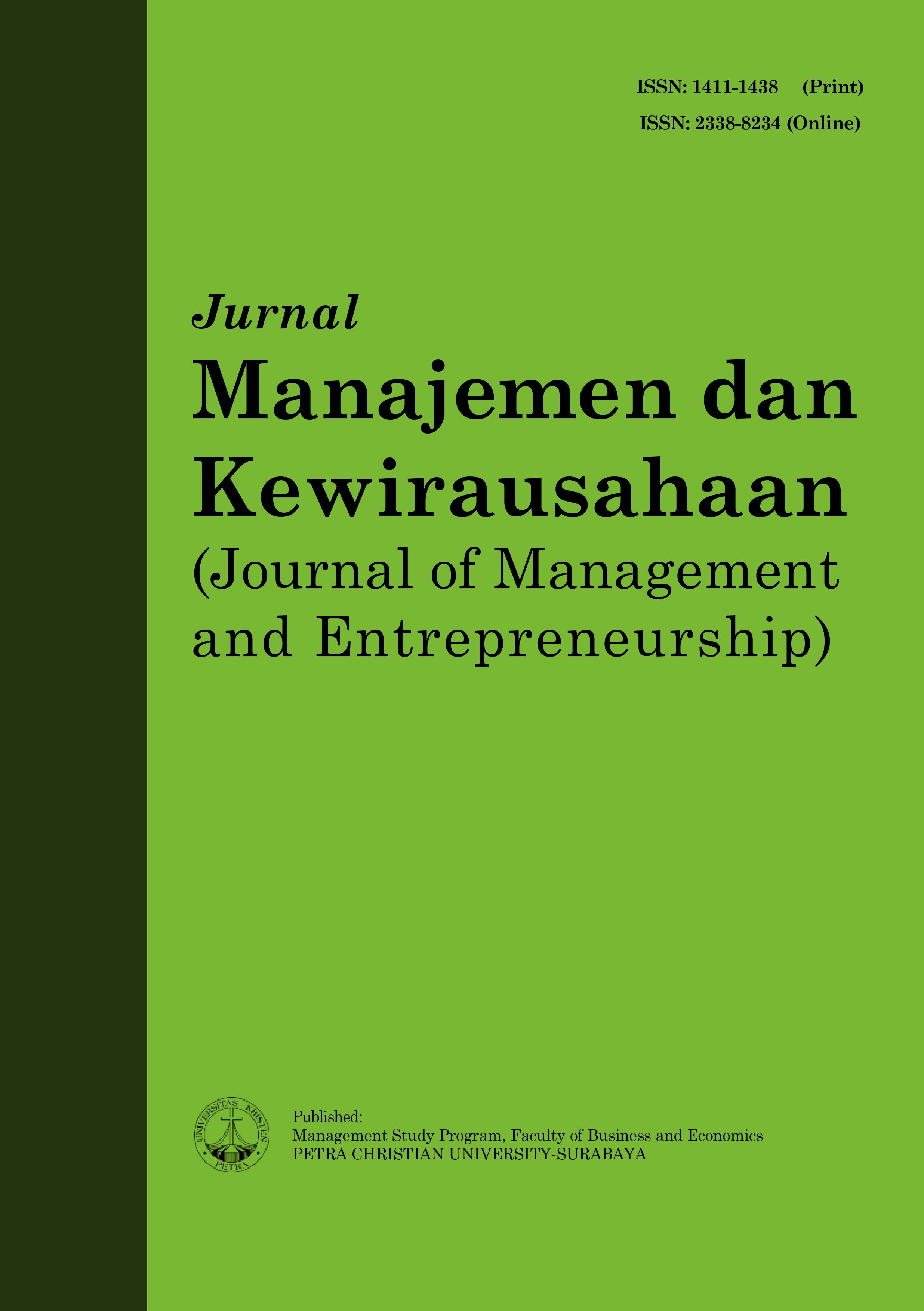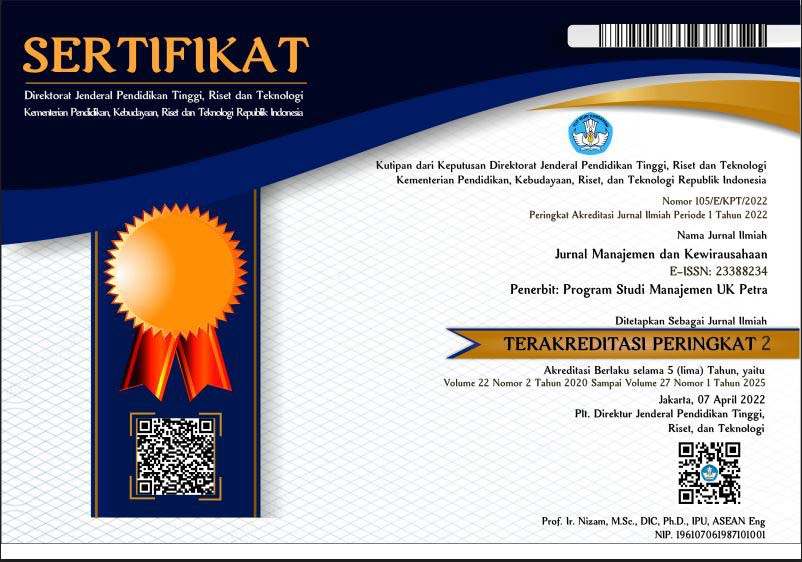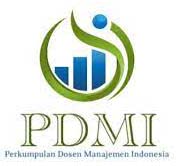JOB AUTONOMY, JOB CRAFTING AND EMPLOYEES’ WELL-BEING DURING WORKING FROM HOME
 :
:
https://doi.org/10.9744/jmk.23.2.177-185
Keywords:
Job crafting, job autonomy, well-being, job design, COVID-19 pandemicAbstract
Workplace stressed employees’ well-being because people have to work from home (WFH) and adapt to a new routine of work and life since Covid-19 struck the world. Employees who WFH increase their perception of more autonomous on how to handle their tasks, this is known as job autonomy. This study aimed to examine the relationship between job autonomy and well-being, and the mediating effects of job crafting on job autonomy and employees’ well-being during WFH in Covid-19 Pandemic. An online survey was conducted and there were 427 respondents involved. The model was analyzed using WarpPLS 7.0 and the results showed that no significant relationship was found between job autonomy and well-being. Moreover, job autonomy and job crafting are related as well as job crafting and well-being. Job crafting significantly mediate the relationship between job autonomy and well-being. This study showed that during WFH, employee experience an excessive degree of job freedom and it give them more work pressure and decrease employees' subjective well-being. In a conclusion, this study brings several concerns that organizations should be giving attention to.
References
Breaugh, J. A. (1999). Further investigation of the work autonomy scales: Two studies. Journal of Business and Psychology, 13(3), 357–373. https://doi.org/10.1177/001872678704000604
Chang, P. C., Rui, H. & Wu, T. (2021). Job auto¬no¬my and career commitment: A moderated me¬diation model of job crafting and sense of calling. SAGE Open, 11(1), 1–11. https:// doi.org/10.1177/21582440211004167
Crawford, E. R., & LePine, J. A. (2014). A con¬fi¬gural theory of team processes: Accounting for the structure of taskwork and teamwork. Acade¬my of Management Review, 38(1), 32–48. https://doi.org/ 10.5465/amr.2011.0206
Crawford, E. R., LePine, J. A., & Rich, B. L. (2010). Linking job demands and resources to em¬plo¬yee engagement and burnout: A theo¬re¬ti¬cal extension and meta-analytic test. The Jo¬urnal of Applied Psychology, 95(5), 834–848. https://doi.org/ 10.1037/a0019364
Debus, M., Gross, C., & Kleinmann, M. (2020). The power of doing: How job crafting trans¬mits the beneficial impact of autonomy amo¬ng overqua-lified employees. Journal of Busi¬ness and Psy-chology, 35(3), 317–331. https://doi.org/10.1007/ s10869-019-09625-y
Deci, E. L., & Ryan, R., M. (2008). Self-deter¬mi¬na¬tion theory: A macro theory of human mo¬tivation, development, and health. Canadian Psychology, 49(3), 182–185 https://doi.org/10.1037/A0012801
Demerouti, E., & Bakker, A. B. (2014). Job craf¬ting. In M. C. W. Peeters, J. De Jonge, & T. W. Taris (Eds.), An introduction to con¬tem¬porary work psychology (pp. 414–437). Wi¬ley Blackwell.
Franken, E., Bentley, T., Shafaei, A., Farr-Wha¬r¬ton, B., Onnis, L., & Omari, M. (2021). For¬ced flexibility and remote working: Oppor¬tu¬nities and challeng-es in the new nor¬mal. Jo¬urnal of Management & Organization, 1–19. https://doi.org/10.1017/jmo. 2021.40
Gajendran, S. R., Harrison, A. D., & Delaney-Kli¬nger, K. (2014). Are telecommuters remo¬tely good citizens? Unpacking telecom¬mu¬t¬ing's effects on performance via i-deals and job re¬sources. Per-sonnel Psychology, 68(2), 353–393. https://doi.org/ 10.1111/peps.12082
Guan, X., & Frenkel, S. (2018). How HR practice, work engagement and job crafting influence em¬ployee performance. Chinese Mana¬ge¬ment Studies, 12(3), 591–607. https://doi.org/10.1108/ CMS-11-2017-0328
Hackman, J. R., & Oldham, G. R. (1976). Mo¬ti¬va¬tion through the design of work: Test of a theory. Organizational Behavior & Human Perfor¬mance, 16(2), 250–279. https://doi.org/10.1016/ 0030-5073(76)90016-7
Hair, J. F., Black, W. C., Babin, B. J., & An¬der¬son, R. E. (2010). Multivariate data analysis. 7th Edition. New York, NY: Pearson.
Hakanen, J. J., & Roodt, G. (2010). Using the job demands-resources model to predict engage¬ment: Analysing a conceptual model. In A. B. Bak¬ker, & M. P. Leiter (Eds.). Work enga¬ge¬ment: A Handbook of essential theory and re¬search, pp. 85–101. New York, NY: Psy¬chology Press.
International Labour Organization. (2020). Tele¬working during the COVID-19 pandemic and beyond: A practical guide. Retrieved from https://www.ilo.org/wcmsp5/group s/pub lic/---ed_protect/---protrav/---travail/doc uments/instructionalmaterial/wcms_751232.pdf
Kim, H., Im, J., Qu, H. N., & Koong, J. N. (2018). An-tecedents and consequences of job craft¬ing: An organizational level approach. Inter¬na¬tio¬nal Journal of Contemporary Hospi¬ta¬lity Ma¬na¬ge¬ment, 33(3), 1863–1878. https://doi.org/10.1108/ IJCHM-01-2017-0040
Kristof-Brown, A. L., Zimmerman, R. D., & Jo¬hn¬son, E. C. (2005). Consequences of indi¬vi¬dual's fit at work: A meta-analysis of person-job, person-organization, person-group, and person-super¬visor fit. Personnel Psychology, 58(2), 281–342. https://doi.org/10.1111/j.17446570.2005.00672.x
Kubicek, B., Paskvan, M., & Bunner, J. (2017). The bright and dark sides of job autonomy. In C. Korunka, & B. Kubicek (Eds.), Job de¬mands in a changing world of work (pp. 45–63). Springer, Cham. https://doi.org/10.1007/978-3-319-54678 -0_4
Li, J., Han, X., Qi, J., & He, X. (2020). Managing one’s career: The joint effects of job auto¬no¬my, super-visor support, and calling. Journal of Career Development, 1–14. https://doi.org/10.1177/089 4845320906464
Nielsen, K., & Abildgaard, J. (2012). The de¬ve¬lop¬ment and validation of a job crafting mea¬sure for use with blue-collar workers. Work & Stress, 26(4), 365–384, https://doi.org/10.1016/j.jvb.2011.05. 009
Palumbo, R. (2020). Let me go to the office! An in¬vestigation into the side effects of working from home on work-life balance. Inter¬na¬ti¬onal Journal of Public Sector Management, 33(6–7). https://doi.org/10.1108/IJPSM-06-2%20020-,0150
Park, R., & Jang, S. (2015). Mediating role of per¬ceived supervisor support in the relationship between job autonomy and mental health: Mo-derating role of value–means fit. The In¬ter¬national Journal of Human Resource Ma¬nagement, 28(5), 703–723. https://doi.org/10 .1080/09585192.2015.1109536
Park, R., & Searcy, D. (2012). Job autonomy as a predictor of mental well-being: The mode¬ra¬ting role of quality-competitive environment. Journal of Business and Psychology, 27(3), 305–316. https://doi.org/10.1007/s10869-01 1-9244-3
Petrou, P., Demerouti, E., Peeters, C. W., Sch¬au¬feli, B. W., & Hetland, J. (2012). Crafting a job on a daily basis: Contextual correlates and the link to work engagement. Journal of Organizational Beha¬vior, 33(8), 1120–1141. https://doi.org/10.1002/ job.1783
Petrou, P., Demerouti, E., & Schaufeli, W. B. (2018). Crafting the change: The role of em¬ployee job crafting behaviors for successful organizational change. Journal of Manage¬ment, 44(5), 1766–1792. https://doi.org/10.1177/0149206315624961
Saragih, S., Margaretha, M., & Situmorang, A. (2020). Analyzing antecedents and conse¬qu¬ence of job crafting. International Jour¬nal of Management, Economics and Social Sci¬en¬ces, 9(2), 76–89. https://doi.org/10.32327/IJ MESS/9.2.2020.5
Sato, A. (2013). Teleworking and changing work-places. Japan Labor Review, 10(3), 56–69. http://www.jil.go.jp/english/JLR/documents/2013/JLR39_sato.pdf
Sekiguchi, T., Li, J., & Hosomi, M. (2017). Pre¬dic¬ting job crafting from the socially embed¬ded perspec-tive: The interactive effect of job autonomy, social skill, and employee status. The Journal of Applied Behavioral Science, 53(4), 470–497. https://doi.org/10.1177/0021 886317727459
Simone, S. (2014). Conceptualizing wellbeing in the workplace. International Journal of Bu¬siness and Social Science, 5(12), 118–122.
Singh, V. L., & Singh, M. (2018). A burnout mo¬del of job crafting: Multiple mediator effects on job per¬formance. IIMB Management Re¬view, 30(4),
–315. https://doi.org/10.1016/j.iimb.2018.05. 001.
Slemp, G., Kern, M., & Vella-Brodrick D. (2015). Workplace well-being: The role of job cra¬ft¬ing and autonomy support. Psychology of Well-Being, 5(7), 16–17. https://doi.org/10.1186/s136 12-015-0034-y.
Tims, M., Bakker, A. B., & Arnold, B. (2010). Job crafting: Towards a new model of individual job redesign. SA Journal of Industrial Psy¬chology, 36(2), 1–9. https://doi.org/10.4102/sajip.v36i2.841
Tims M., Bakker, A. B., & Derks, D. (2012). De¬velop-ment and validation of the job craft¬ing scale. Journal of Vocational Behavior, 80(1), 173–186. https://doi.org/10.1016/J.JVB.201 1.05.009.
------ (2013). The impact of job crafting on job de¬mands, job demands, job resources, and well-being. Journal of Occupational Health Psy¬cho¬logy, 18(2), 230–240. http://doi.org/10.1037/ a0032141.
Vanbelle, E., Van den Broeck, A., & De Witte, H. (2017). Job crafting: Autonomy and work¬lo¬ad as antecedents and the willingness to con¬tinue working until retirement age as a posi¬tive outcome. Psihologia Resurselor Umane Revista Asociaţiei de Psihologie Indusstrială şi Organi-zaţională, 15(1), 25–41. https://doi.org/10.24837/ pru.2017.1.3.
Van-Wingerden, J., Bakker, A., & Derks, D. (2017). Fostering employee well-being via a job cra¬f¬ting intervention. Journal of Voca¬ti¬onal Be¬havior, 100, 164–174. https://doi.org/10.1016/j.jvb.2017. 03.008.
Vyas, L., & utakhieo, N. (2021). The impact of working from home during COVID-19 on work and life domains: An exploratory study on Hong Kong. Policy Design and Practice, 4(1), 59–76. https://doi.org/10.1080/2574129%202.2020.186 3560.
Warr, P. (1990). The measurement of well-being and other aspects of mental health. Journal of Occu-pational Psychology, 63, 193–210. https://doi.org/ 10.1111/j.2044-8325.1990.tb 00521.x.
Wrzesniewski, A., & Dutton, J. (2001). Crafting a job: Revisioning employees as active crafters of their work. Academy of Management Re¬view, 26(2), 179–201. https://doi.org/10.230 7/259118.
Yang, F., & Zhao, Y. (2018). The effect of job autonomy on psychological well-being: The mediating role of personal initiative. Open Journal of Social Sciences, 6(11), 234–248. https://doi.org/10.4236/jss.2018.611017.
Zhou, E. (2020). The “too-much-of-a-good-thing” effect of job autonomy and its explanation mecha¬nism. Psychology, 11(2), 299–313. https://doi.org/10.4236/psych.2020.112019.
Downloads
Published
How to Cite
Issue
Section
License
Authors who publish on this journal agree to the following terms:
- Authors retain copyright and grant the journal right of first publication with the work simultaneously licensed under a Creative Commons Attribution License that allows others to share the work with an acknowledgement of the work's authorship and initial publication in this journal.
- Authors are able to enter into separate, additional contractual arrangements for the non-exclusive distribution of the journal's published version of the work (e.g., post it to an institutional repository or publish it in a book), with an acknowledgement of its initial publication in this journal.
- Authors are permitted and encouraged to post their work online (e.g., in institutional repositories or on their website) prior to and during the submission process, as it can lead to productive exchanges, as well as earlier and greater citation of published work (See The Effect of Open Access).


















